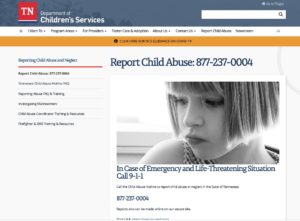A lawsuit filed earlier this month by journalist Stacy Jacobson of WREG in Memphis is seeking access to records related to the Department of Children’s Services interactions with a 14-year-old boy who died in Memphis 2020.
The boy was found dead at his home Jan. 7, 2020. The state department’s investigation into the boy’s death concluded that the boy suffered abuse and neglect by members of his family. Other children also lived in the home and were evaluated by DCS.
According to state law, after DCS closes an investigation into a child fatality or near fatality, it is required to publicly release the final disposition of the case, whether the case meets criteria for child death review and “the full case file.” The requirement to release “the full case file” was added to the law in 2014 after litigation against DCS for not releasing information about child deaths.
DCS gave Jacobson only heavily redacted documents of its file on the boy and did not release reports from four previous investigations related to the child which occurred in 2006, 2008, 2009 and 2015.
Lawsuit: Disclosing records provides accountability for DCS actions
Jacobson claims that the agency’s refusal to release the four previous reports violates the law requiring the release of the full case file after DCS closes a child death investigation. She also claims that the state redacted information from documents without legal justification.
“When a child dies from abuse or neglect, the public has a strong interest in learning what role, if any, the Department had in the child’s life preceding their death and evaluating the actions or inactions of the Department related to the child,” Jacobson’s lawsuit says in its memorandum of law. “Disclosing information about child deaths, including the Department’s full case file, is critical to the ‘effort to provide public accountability for the action or inaction of public officials.'”

Journalist Stacy Jacobson of WREG Memphis is seeking records that would show the Department of Children’s Services’ previous interactions with a 14-year-old boy who died in 2020. After he died, the state concluded he had suffered abuse and neglect.
Jacobson is represented by Paul McAdoo, an attorney with the Reporter’s Committee for Freedom of the Press and part of the nonprofit’s Local Legal Initiative.
Not first time DCS has withheld records
This is not the first time DCS has been sued for not releasing information about deaths or near-deaths of children who were either under DCS supervision or had been known or evaluated by the agency based on previous alerts.
In 2013, a Davidson County chancellor ordered DCS to release information on 200 deaths or near-deaths of children after The Tennessean news organization took the state agency to court.
New law required more disclosure after DCS finished investigation
After that, in 2014, state lawmakers changed the law to require the state to release “the full case file” after the agency’s investigation into a child fatality or near fatality, providing for redactions of information otherwise made confidential by that section of the law, such as information that could identify children or identify a person who alerted the department to possible abuse.
Previously, the law only required “public disclosure of information about any case that results in a child fatality or near fatality.”
The state agency claims some of the information is confidential under the so-called “investigative exemption” that allows law enforcement and prosecutors to withhold records relevant to a criminal proceeding.
But McAdoo argues that the statute requiring disclosure of the “full case file” with redactions for confidentiality as required by the statute supersedes the so-called criminal investigative exemption, which would not be relevant here. This investigative exemption, which is based on Supreme Court’s rules on discovery in a criminal proceeding, Rule 16, lasts until a case if finished, including any appeals.
Jacobson says that would be too long.
Lawsuit: Delaying release of records weakens public oversight
“Moreover, for the public to effectively exercise its oversight function (of DCS), its access to information must also be timely. Delaying the disclosure of nearly all substantive information in child-death case files pursuant to Rule 16, while any related criminal cases wend their way through the court system, significantly diminishes, if not destroys, the public’s ability to meaningfully oversee the (Children’s Services) Department and promptly hold it accountable.
“As time passes, public interest in the tragedy and related media coverage will fade and the public’s oversight role will be weakened,” the lawsuit says.
The lawsuit presses the court to consider how the delay prevents public oversight of DCS.
“The newsworthiness of a particular story is often fleeting. To delay or postpone disclosure undermines the benefit of public scrutiny and may have the same result as complete suppression,” the lawsuit states, quoting a 7th U.S. Circuit Court of Appeals decision. Quoting from the Florida Supreme Court, “News delayed in news denied. To be useful to the public, news events must be reported when they occur.”
“Timely disclosure of child-death case files, on the other hand, ensures that such tragedies receive the public and press scrutiny needed to spark any necessary reforms and hold the Department accountable for any shortcomings,” the lawsuit says.
Lawsuit: Redactions go too far
Although DCS did release limited information from its file, Jacobson’s lawsuit says “it is evident from the redacted records that the Department’s far-reaching redactions cover not just the child’s, family’s and referent’s identifying information, as required by Tenn. Code Ann § 37-5-107, but whole paragraphs and pages of text, including nearly all information on how the child died and why the Department concluded his death was caused by abuse and neglect…
“These redactions are not only inconsistent with the provisions of Tenn. Code Ann. § 37-5-107, but also undermine the very purpose behind public disclosure of the full case file of a deceased child.”
The lawsuit also argues that DCS’s interpretation of “full case file” to be only the records related to the 2020 investigation is flawed. The released case file briefly references four previous investigations by DCS into the child with two notations: “Susbstantial Risk Sexual Abuse/Unable to Complete” and “Child with Sexual Behavior Problems.”
“A file on the death of a child that omits any documentation other than this extremely limited information about prior investigations by the Department related to the deceased child is far from ‘full’ or complete and fails to satisfy the statutory mandate of disclosing the full case file.”
McAdoo argues that federal law also supports releasing records from prior investigations of neglect and abuse after a death by requiring states receiving federal funds to publicly disclose information on the state’s prior investigations and services provided to the child. This measure was passed by Congress and designed to counteract agencies that would withhold such information.
“Without access to prior investigations, the public is left to guess what the Department did or did not do to protect the deceased child and his siblings prior to the child’s death.”
The public records lawsuit is scheduled to be heard by Chancellor Patricia Moskal in Nashville at 1:30 p.m. June 3 in the Davidson County Courthouse.






